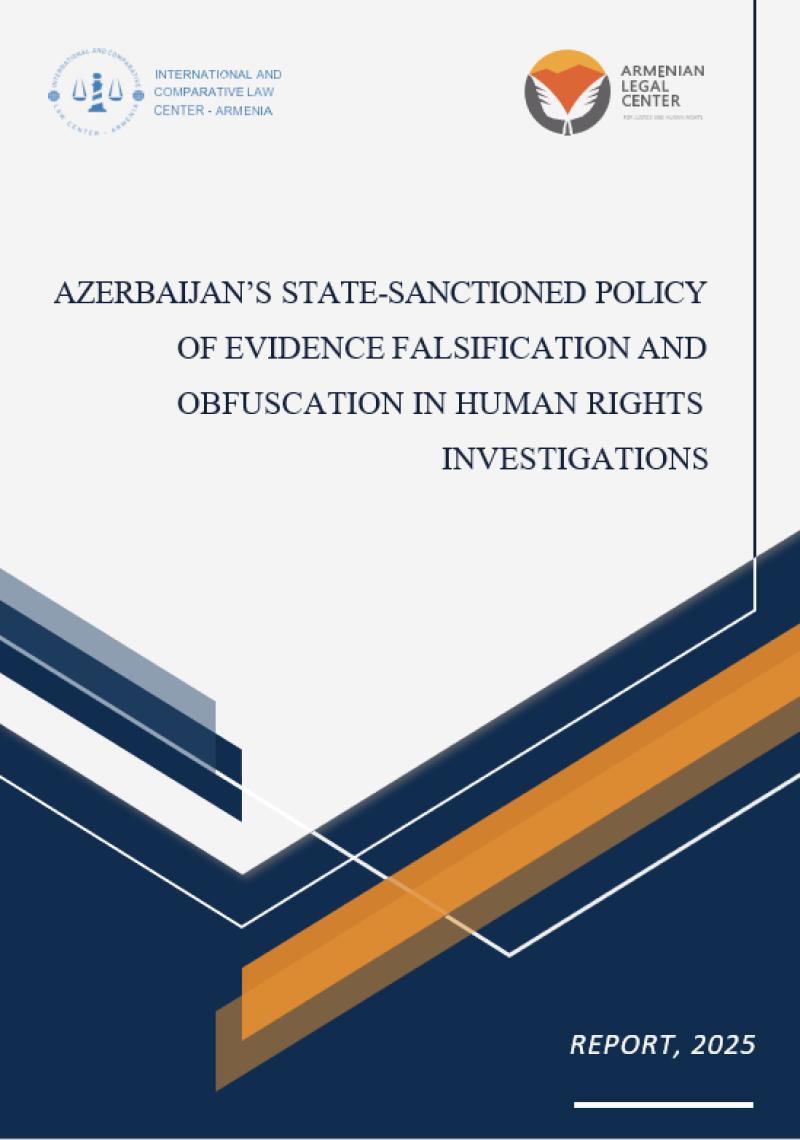
The falsification of evidence, the manipulation of investigations, and the obstruction of justice constitute an integral part of Azerbaijan's state policy.
Independent international investigative bodies, legal institutions, foreign experts, and human rights organizations have revealed numerous instances of Azerbaijan's fabrication of charges, manipulation of forensic conclusions, concealment of evidence, and deliberate failure to investigate human rights violations.
The "Center for International and Comparative Law," in collaboration with the "Armenian Legal Center for Justice and Human Rights," has prepared a report detailing Azerbaijan's systemic practice of falsifying and distorting evidence as a means of concealing war crimes and human rights abuses from the international community.
Reputable international organizations such as Human Rights Watch (HRW) and Amnesty International have also documented this modus operandi of Azerbaijan. It includes targeted attacks, arbitrary arrests, and politically motivated persecutions of both citizens as well as those who protest corruption and speak out against human rights violations committed by the authorities. Azerbaijani authorities frequently employ the practice of targeting individuals who speak out against state policy and attempt to defend human rights, a method through which Azerbaijan seeks to conceal actual violations. This demonstrates that the state is not committed to protecting human rights but rather persecutes those who defend them.
The U.S. Department of State's 2021 report confirms that Azerbaijan regularly fails to hold accountable those officials who commit human rights violations and engage in corruption. Moreover, in the "investigations" carried out by Azerbaijan regarding human rights violations, clear patterns of evidence falsification and manipulation, a lack of transparency, and an inability to hold perpetrators accountable have been observed.
In numerous cases, the Azerbaijani authorities have not only been directly involved in violations but have also attempted to conceal them. A case in point is "Lapshin v. Azerbaijan." The former was imprisoned for crossing the state border after covering the Nagorno-Karabakh conflict. Lapshin was subjected to torture in an Azerbaijani prison, and his life was in danger. However, Azerbaijan refused to properly investigate the incident, classifying it as a suicide attempt despite significant evidence to the contrary.
Azerbaijan's national human rights institution has a documented history of refusing to investigate or combat systemic violations. Consequently, in 2018, it was downgraded from "A" to "B" status, indicating its inability to operate impartially, as well as its failure to open investigations into credible allegations of human rights abuses.
The University Network for Human Rights notes that Azerbaijan has, to date, failed to investigate, charge, or convict any member of the Azerbaijani Armed Forces for the atrocities committed against Armenians during the 2020 and 2023 attacks on Nagorno-Karabakh. Numerous judgments by the European Court of Human Rights (ECHR) have revealed the scale of Azerbaijan's falsification of evidence, deliberate procedural violations, and systemic impunity for crimes committed against Armenian victims.
Considering these and other documented cases, Azerbaijan exhibits a recurring pattern of falsifying evidence and obstructing justice, including the manipulation of witness testimonies and forensic evidence, as well as the refusal to investigate state-sponsored violations.
Azerbaijan's legal institutions operate with impunity at all levels, characterized by a lack of independence, a refusal to investigate crimes by state bodies, and direct involvement in concealing human rights violations. This trend is particularly evident in the records of human rights abuses committed by Azerbaijan against Armenians. Charges have been fabricated to justify politically motivated arrests, forensic conclusions have been manipulated to conceal traces of torture and violence, physical evidence, including autopsy results, has been falsified, and witness testimonies have been fabricated to obstruct examinations.
Given the above, the report expresses concern regarding the removal of the International Committee of the Red Cross (ICRC) from Azerbaijan. "We call on the international community to take into account the documented and systemic pattern of Azerbaijan's falsification of evidence and obstruction of justice when examining all evidence and reports presented by Azerbaijan in international legal disputes," the report states.